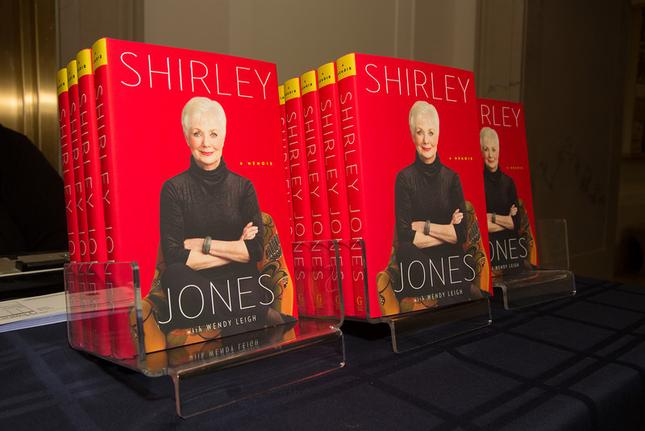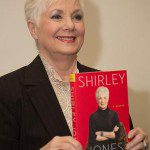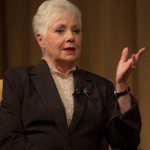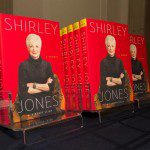The National Archives William McGowan Theater was the setting, and iconic movie and television star Shirley Jones sat on the stage, being interviewed by Washington Post film critic Ann Hornaday.
It was a kind of two-for-one occasion, maybe even a three-for-one, in the sense that Jones, now 79 and looking good, was here for a book signing of “Shirley Jones: A Memoir”, which is, well, a memoir, but also appeared as part of the Archives’ ongoing and expansive exploration of an exhibition ”Searching for the Seventies: The DocuAmerica Photography Project”.
So here was Jones, a big star of post-Golden-Age Hollywood with early big-time starring roles as Laurey in “Oklahoma” and Julie Jordan in “Carousel”, two big-big screen versions of the Rodgers and Hammerstein musicals in the 1950s. Those roles and a turn as Marian the librarian in the movie version of “The Music Man”, made Jones an iconic embodiment of cinematic wholesomeness that might have made even the reigning virgin queen of the times Doris Day jealous.
Not to worry: Jones gave up the title with a juicy role of prostitute Lulu Bains in the film version of the Nobel Prize winning American novelist Sinclair Lewis’ 1920s portrait of a tent-show preacher huckster “Elmer Gantry”, with Burt Lancaster in the title role.
The musicals and “Gantry” figure were strongly in the talk at the Archives, as well as stories about her even more iconic role as Shirley Renfrew Partridge in the hugely popular 1970s television series “The Partridge Family”, which featured her step-son David Cassidy and a young actress named Susan Dey. Cassidy, as some of us all know and remember, went on to become the Justin Bieber of his day, achieving the kind of rock star fame that in the end he didn’t handle well, or never recovered from.
The book itself—which was referenced often—has been a fodder of celebrity headlines for its tales of sexual escapades and awakening of Jones—a nice young small town girl from Smithson, near Pittsburgh, Pennsylvania whom was fortunate to be blessed with a marvelous voice and good looks. As a young girl she married a guy named Jack Cassidy—the “love of my life”—and was transformed. The details of that transformation—most of it about the eccentric, unfaithful, charismatic and sexually voracious Cassidy whom she describes as her “Svengali”—while making it to the airwaves (“Access Hollywood”) and the blogosphere, do not get into the conversation here. It was, after all, the National Archives, and there were tourists, families and children in the audience.
Which is just as well, because Jones’ life and career and her candor about her life make for a terrific American success story as is.
“I was an only child, and I was willful,” she acknowledged. She looked vibrant and down to earth, no-nonsense. She and Cassidy, who would die in a tragic fire, would divorce, but she’s now married to standup comedian Marty Ingels whom she describes as “the love of my life now.”
“Marty loves going to red carpet events and having me by his side,” she said. “Once, when I couldn’t go to one of those things, he took a cardboard cutout of me to the red carpet.
“I married two crazy men,” she said. “What does that say about me?”
What you can really say about Shirley Jones is that she’s brave, funny, resilient, and gifted, with an appetite for life. Which is not a bad legacy.
She had been invited to New York to perhaps audition for a show, although she had no idea who she was auditioning for. “I had never heard of Rodgers and Hammerstein, I didn’t know who these men were. But apparently they liked what they heard.”
She was young, inexperienced, but managed to snag roles in “South Pacific”, “Me and Juliet” and “Oklahoma.”
It was the same when it came to films. “I was asked to audition for the film version,” she said. “I had never made a movie in my life.”
“Director Fred Zinneman wanted me for the part. He was a brilliant director, an actor’s director, he was incredibly patient and helpful,” she said. She was Laurie to Gordon MacRae’s Curly and they also co-starred in “Carousel” as Julie and Billy Bigelow. “That was as my favorite all time musical, period.”
She confided that Frank Sinatra had been originally cast in the role of Billy Bigelow. “They’d already shot some scenes, and the movie was being done in two versions, in regular Cinemascope and a bigger version of the same process. That meant that they’d do two takes. When Frank Sinatra found out, he said, ‘I don’t do two takes’ and walked off the set. That’s one take Frank for you. Gordon, by contrast was easy going, he’d do a scene or the recording, and off he’d go to play golf. That’s what he really wanted to do in life.”
Her reputation established, Jones knew she wanted to act, not just be typecasted. “I got a call from Burt [Lancaster] and he asked me to read the book “Elmer Gantry”,” she said. “Read the book. I want you in the movie.”
“So I read it,” and I called him. “I want you for the part of the prostitute, he told me. I said ‘what!’ ‘It’s perfect for you. You watch. But the director, Richard Brooks, didn’t really want me. And he didn’t direct me. Burt insisted. Brooks saw the rushes from the first scene. He said ‘I want to apologize to you. You’re going to win an Oscar for this.”
And she did. She won best supporting actress, beating out Janet Leigh in “Psycho,” no less, and Lancaster got a best actor nod.
You get the idea she could talk about her old Hollywood compatriots for hours. She does a better than decent Jimmy Stewart imitation and sings praises of the under-rated actor and star Richard Widmark. She worked with both in a John Ford western “Two Rode Together.”
Fame and stardom of a different sort came with “The Partridge Family”. The show vied with “The Brady Bunch”, another iconic 1970s show of a similar stripe minus the rock band element, for public glory. “They told me not to do it, that I’d be associated with the role forever, that it would be hard to go back to what you were,” she said. “And they were right.”
“It was funny,” she said. “David (Cassidy) and I were cast separately and he didn’t know I was in the show,” she said. “So here we were and he looked at me and said ‘What are YOU doing here’ and I said, “I’m in the show. I’m your momma.”
Over the years she’s been in almost countless television shows. She toured with Cassidy in musical productions. She is unsinkable, indefatigable, and in some ways still the girl from Smithson, the kind of town were people tend to straight-talk.
Whether it is Marian the Librarian, Shirley Renfrew Partridge, Julie Jordan or Shirley Jones, she remains, memoirs and all, an American original.
- Jeff Malet





